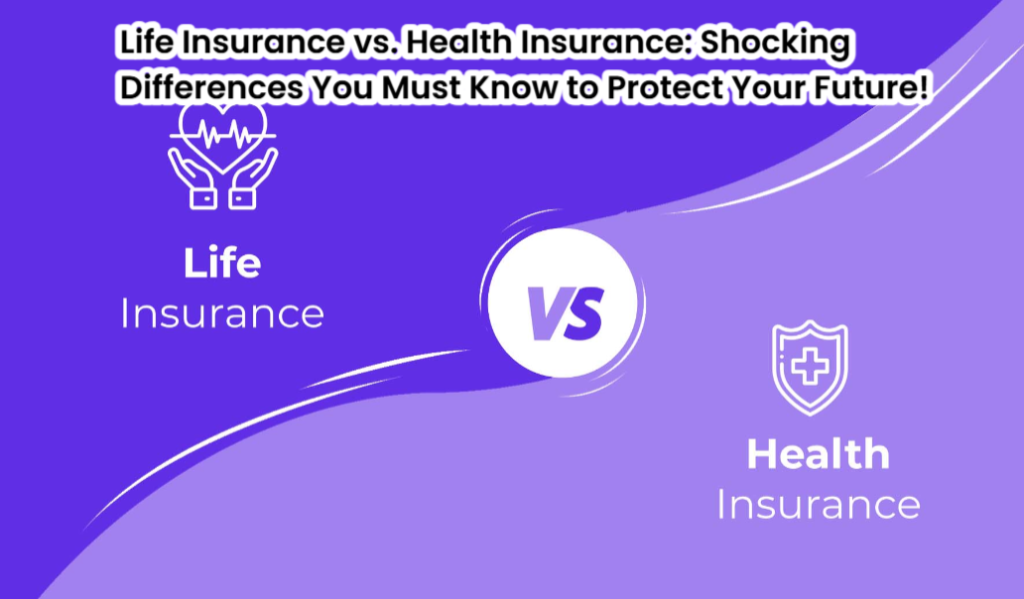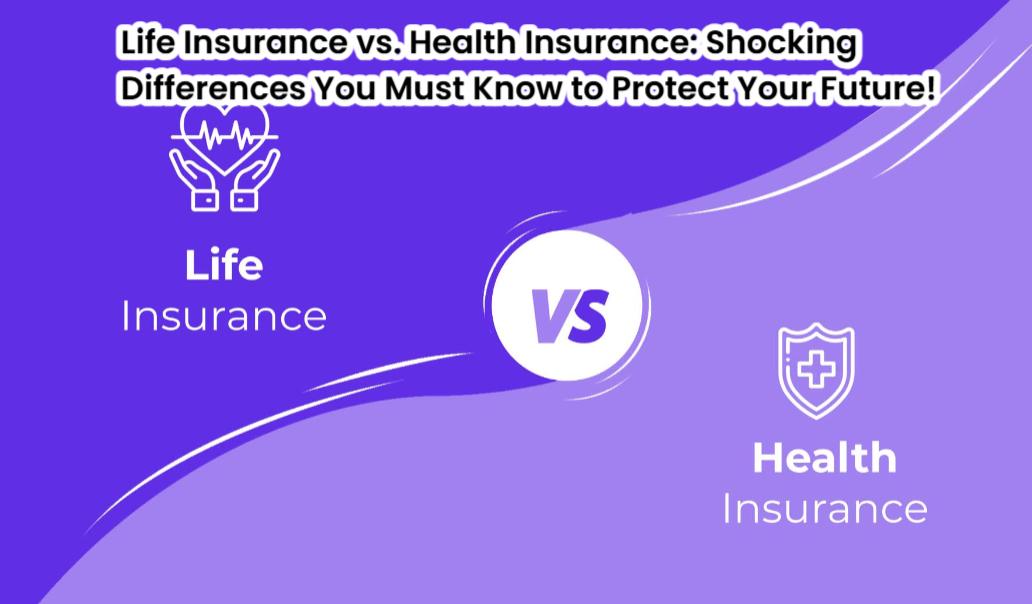Insurance is a key financial tool. It protects individuals and families from unexpected hardships. Two of the most important types of insurance are life insurance and health insurance. While both provide crucial coverage, they serve entirely different purposes.
Life insurance gives your beneficiaries financial support when you pass away. This helps keep your loved ones stable without you. Health insurance helps pay medical bills. This way, healthcare costs won’t overwhelm you over time.
Many people wrongly think that having one type of insurance means they don’t need another. In reality, both are critical components of financial planning. This guide will explain the key differences between life insurance and health insurance. It will also discuss their benefits, costs, and important factors to consider when making your choice.

What Is Life Insurance?
Life insurance is designed to provide financial security for your dependents in the event of your death. It ensures that your family members are not left struggling financially, especially if they depend on your income.
When you buy a life insurance policy, you pay premiums. In return, your beneficiaries receive a death benefit when you pass away. The payout can be used to cover expenses such as:
- Funeral and burial costs
- Outstanding debts, including mortgages and loans
- Living expenses for dependents
- Children’s education
- Financial security for a surviving spouse
Types of Life Insurance
There are several types of life insurance policies, each serving different needs:
- Term Life Insurance
- Provides coverage for a specific period (e.g., 10, 20, or 30 years).
- Pays a death benefit only if the insured dies during the term.
- More affordable compared to permanent life insurance.
- No cash value accumulation.
- Whole Life Insurance
- Provides lifelong coverage.
- Includes a cash value component that grows over time.
- Premiums are higher than term life insurance but remain fixed.
- Can be used as an investment or savings tool.
- Universal Life Insurance
- Provides flexible coverage with adjustable premiums and death benefits.
- Builds cash value that can be used for loans or withdrawals.
- Allows policyholders to adjust their coverage as their financial needs change.
- Variable Life Insurance
- Similar to whole life insurance but with investment options for cash value growth.
- The policyholder can invest in stocks, bonds, and mutual funds.
- Riskier than traditional whole life insurance as cash value fluctuates with market performance.
Who Needs Life Insurance?
- Individuals with dependents (spouse, children, elderly parents).
- People who want to leave behind a financial legacy.
- Business owners who need a succession plan.
- Homeowners who want to protect their mortgage.
What Is Health Insurance?
Health insurance helps cover medical costs from illness, injury, or preventive care. With health insurance, people don’t pay all medical costs themselves. They cover part of the expenses, and the insurance provider pays the rest.
Health insurance makes it easier for people to pay for needed medical care. This helps prevent financial stress from high healthcare bills. Without insurance, even routine medical care can become financially burdensome.
Types of Health Insurance
- Employer-Sponsored Health Insurance
- Offered by employers as part of employee benefits.
- Covers a portion of medical expenses, with employees and employers sharing the cost.
- Individual Health Insurance
- Purchased independently from private insurers or through government marketplaces.
- Offers flexibility in coverage but can be more expensive than employer-sponsored plans.
- Government Health Insurance
- Medicare (for seniors and people with disabilities).
- Medicaid (for low-income individuals and families).
- Affordable Care Act (ACA) Marketplace plans.
- Short-Term Health Insurance
- Provides temporary coverage for gaps between jobs or open enrollment periods.
- Limited benefits compared to long-term plans.
Who Needs Health Insurance?
- Everyone should have health insurance to prevent high medical costs.
- People with chronic conditions that require regular treatment.
- Families with children who need regular doctor visits and vaccinations.
- Self-employed individuals without employer-sponsored plans.
Key Differences Between Life Insurance and Health Insurance
Feature Life Insurance
- Purpose: Provides financial support to beneficiaries after death.
- Coverage Duration: Term (fixed period) or whole life (lifetime).
- Payout: Lump sum to beneficiaries.
- Premiums: Based on age, health, and policy type.
- Cash Value Component: Some policies accumulate cash value.
- Tax Benefits: Death benefits are usually tax-free.
Health Insurance
- Purpose: Covers medical expenses while you’re alive.
- Coverage Duration: Renewed annually or for a set policy period.
- Payout: Pays for medical treatments and services.
- Premiums: Based on age, health, and coverage level.
- Cash Value Component: No cash value accumulation.
- Tax Benefits: Some medical expenses may be tax-deductible.
Which One Do You Need?
The decision depends on your financial situation, goals, and risk factors.
- If you have dependents who rely on your income, life insurance is essential.
- If you want to ensure access to healthcare without facing huge bills, health insurance is a must.
- Many people need life insurance for long-term financial security. They also need health insurance for immediate medical expenses.
Must read:
- Ultimate Guide: Shocking Truths About Choosing the Perfect Insurance Policy (Don’t Get Trapped!)
- Shocking Truth About Deductibles, Premiums & Coverage Limits – Are You Overpaying?
FAQs
u003cstrongu003eCan I Have Both Life and Health Insurance?u003c/strongu003e
Yes! Many people carry both types of insurance to ensure full financial protection.
u003cstrongu003eWhat Happens If I Don’t Have Health Insurance?u003c/strongu003e
You risk paying high out-of-pocket medical expenses, which can cause financial hardship.
u003cstrongu003eCan I Use Life Insurance to Pay for Medical Expenses?u003c/strongu003e
Some life insurance policies let you access funds if you’re diagnosed with a terminal illness. However, they are not a replacement for health insurance.
u003cstrongu003eDo Life Insurance Premiums Increase Over Time?u003c/strongu003e
For term life, they remain fixed for the duration. For whole and universal life, they may stay fixed or increase based on policy terms.
u003cstrongu003eIs Health Insurance Mandatory?u003c/strongu003e
In some countries, it is. Even where it isn’t, having health insurance is highly recommended to avoid huge medical bills.
u003cstrongu003eCan I Get Life Insurance If I Have Pre-Existing Conditions?u003c/strongu003e
Yes, but premiums may be higher. Some insurers offer guaranteed issue policies with no medical exam.
Final Thoughts
Life insurance and health insurance are both key for financial security. However, they serve different purposes. Life insurance helps secure your family’s future. It keeps them financially stable if you pass away. Health insurance gives you access to medical care. It helps you avoid high out-of-pocket costs.
Many people gain from having both types of insurance. They offer long-term security and short-term financial help. Knowing the differences helps you make smart choices to protect yourself and your loved ones.
If you’re considering insurance options, take the time to compare policies and speak with a financial advisor. Making the right choice today will help secure a better future for you and your family.
